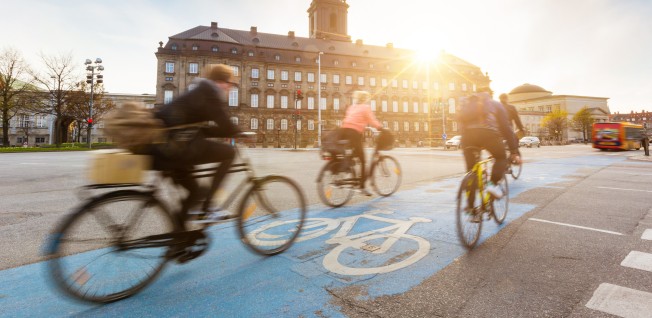Becoming a “Greener” Expat — How to Save the Planet While Living Abroad
Climate change has been making headlines in recent years and continues to be on everyone’s mind, with natural disasters becoming more frequent and weather conditions becoming more extreme. Instead of despairing over this, you can try to live more sustainably to help the environment. We have some tips for expats who are ready to make a change!

Start Small
You want to live a “greener” life but don’t know where to begin? As with anything, the most difficult part is getting started in the first place, but the good news is that making small changes at home can already make a big difference. Look at the items you use every day and ask yourself if some of them can be swapped for environmentally friendly alternatives.
This could mean replacing your old plastic toothbrush with a new one made from bamboo when it is time to do so. You could also get yourself a reusable coffee mug to take to your favorite coffee shop instead of getting your morning coffee in the usual disposable cup. Bit by bit, you will notice more items that you can swap for an environmentally friendly alternative.

Change Your Food Habits
If you adopt small changes during your grocery shopping, you can make a long-term impact. Take a look at the contents of your refrigerator, check the contents, and find out what is about to expire to plan the meals of your week accordingly. By shopping smartly and buying less, you will be able to significantly reduce food waste at home. When it comes to packaging, try to check out local markets or choose fresh produce that isn’t wrapped in plastic. There are small, reusable produce bags that will work just as well.
If you want to avoid waste altogether, check if there is a no-waste or package-free store in your town. These stores allow you to bring your own containers for staples such as rice or pasta, and sometimes even meat or cheese. It is also a great opportunity to swap your plastic shopping bag for that cute tote bag you have lying around at home.
If you want to take it one step further, take a look at your weekly meal plan and ask yourself how you can make it more environmentally friendly. Food production contributes 21–37% of global greenhouse gases and causes deforestation and loss of biodiversity around the world. The biggest culprits are beef and lamb, with cheese and pork not too far behind. Of course, you don’t have to become a vegan right away. Simply reducing your meat and dairy consumption or introducing one or two vegetarian or vegan days per week can already make a big difference.

Another option is to shop locally and seasonally. Sometimes it can be difficult not to buy that Argentinian steak or that delicious avocado if that’s what you’re craving (no matter where you are in the world). But remember that these and other food products travel a long way to get to you, which results in high carbon emissions. Fortunately, there are many grocery stores which sell food that is farmed or grown locally, such as eggs, meat, and seasonal vegetables. Farmers markets are also great places to find local and seasonal produce and other local specialties.
Be Mindful of How You Commute and Travel
For most people, expat life involves a lot of travelling, be it to visit your family or to see other countries and experience other cultures. Unfortunately, air travel is a big contributor to climate change.
Although the aviation industry claims that they are only responsible for about 2% of all carbon emissions, in reality the actual percentage might be much higher. According to Statista, one of the world’s largest statistics databases, commercial airlines burned 96 billion gallons of fossil fuels in 2019.

In some cases, you will have to take a plane to get where you need to go, but when it comes to a quick weekend getaway, try to look at destinations that are closer to you. A relaxing train ride might get you there as well and allow you to enjoy the scenery along the way. Or maybe taking a road trip with friends is an alternative for you — it could even take you to places you would have missed otherwise.
The same applies to your daily commute. If you live in a big city, taking public transportation is not just better for the environment, it is often more practical than taking your car. You might even ditch the train or bus for your bicycle if you don’t live too far from your place of work (and if urban traffic permits it).
Kick Fast Fashion to the Curb
According to the UN Environment Programme, the fashion industry produces 10% of global carbon emissions and could even be responsible for a quarter of the world’s carbon budget by 2050. While some well-known fast fashion labels offer between 12 and 24 collections per year, textiles and clothing are also discarded at an alarming rate — a truckload is burned or dumped in landfills every second.
If you want to kick fast fashion to the curb, you can start by simply buying less. Check your closet for garments that are timeless and still very wearable. They might still make for a fantastic outfit, especially when they are paired with nice accessories. If you do have to buy something new, try to find organic, fair trade labels to buy from, or look for dedicated platforms or online shops that sell second-hand clothing.
If you don’t like some of your clothes anymore or have gained or lost a lot of weight recently (and do not expect your body to regain the shape it had before), there is a great way to get rid of those unwanted items while also meeting new people: participate in a clothes swap!
This type of social event has become rather popular in recent years. You just get together with some friends and see if they would like to “adopt” your clothes while you look through their stash. Aside from the obvious sustainability aspect, it’s also a fun way to meet new people in your community. And if you struggle with finding clothes or shoes your size in your host country, clothes swaps with other expats might be a perfect solution for you.
Keep in mind that the health and safety regulations in your community might not allow for you to meet in person. If the COVID-19 pandemic keeps you from organizing a get-together with your friends, you can always try to do a virtual clothes swap, where every participant shares images of the items they want to trade.
Listen to the Experts
Now that you have learned a thing or two about living more sustainably, you might want to encourage those around you to live a more environmentally friendly life as well. Maybe you feel like businesses in your community are using too much plastic, or you have ideas on how locals could reduce food waste on a larger scale.
Before taking action, do some research and find out if there are any local organizations or initiatives already working to address the issues you are most passionate about, such as waste reduction. They will most likely be more familiar with the current mindset in your host country, as well as with any rules and regulations that might get in the way of making a change. Although you might have lived in many different countries and know of some sustainability strategies that you would love to see implemented, try to listen to the experts first and follow their lead.

Help Push for Change
Although making changes in your personal life can be helpful in order to stop climate change, it is not enough on its own. Instead, larger policy changes worldwide are important. The only way to make such changes happen is to constantly push for them and hold politicians accountable. As an expat, your ability to take action might be limited — voting for candidates that support climate friendly initiatives is off the table for most — but you can join green initiatives, support local groups in their lobby work, or attend climate protests in your new hometown.
Be Patient
Although there is a lot of great advice out there for a greener and more sustainable lifestyle, there is a chance that you won’t be able to adopt all of them into your expat life. Perhaps the public transportation network isn’t well developed enough where you live, so you need your car to commute to work. Or maybe it is difficult to shop plastic-free or find sustainable products in your area. Just keep in mind that you don’t have to be perfect in order to make a change. Every small step towards becoming a greener expat counts!











